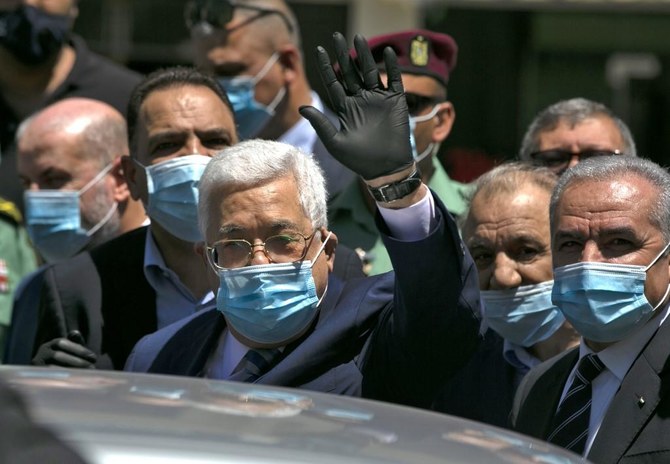AMMAN: Jordan’s Foreign Minister Ayman Al-Safadi made a surprise visit to Ramallah on Thursday to deliver a message of support from King Abdullah to Palestinian President Mahmoud Abbas over Palestine’s opposition to Israeli annexation plans.
Al-Safadi, who was accompanied by director of Jordanian intelligence Maj. Gen. Ahmed Husni, met with Palestinian intelligence chief Majdi Faraj and Abbas’s political adviser Majdi Khalidi, as well as Minister of Civil Affairs Hussein Sheikh.
The Jordanian team arrived on a military helicopter and stayed for lunch at the Ramallah presidential Muqata headquarters.
Speaking after the meeting, Al-Safadi said that Jordan’s support for the Palestinian stance remains strong.
“Our position is steadfast and historic. Jordan, with continuous direction from the king, stands alongside our Palestinian brethren in support of their legitimate rights,” he said.
Al-Safadi criticized annexation as an act of “destruction” to the two-state solution.
“It blows up the very basis of the peace process, and will deny the people of the region their right to live in peace, security and stability,” he added.
Palestinian Foreign Minister Riyad Al-Malki said that the meeting “focused on ways to prevent Israel from annexing large parts of the occupied Palestinian territories and to coordinate joint action to reach our goal.”
Ziad Abu Zayyad, a former Palestinian minister for Jerusalem affairs, told Arab News that the annexation “will be just as dangerous to the national security of Jordan as it is to the future of the Palestinian people.”
The security of both nations is linked, and cooperation between Palestinian and Jordanian leaders is essential, he added.
Hussein Al-Sheik, head of the General Authority of Civil Affairs and a member of the Fatah Central Committee, took part in the meeting and said in a tweet that the Jordanian visit is part of the “joint effort to confront Israeli annexation plans and its repercussions on the region.”
Khalil Jahshan, executive director of the Arab Center in Washington, DC, told Arab News that Jordan’s campaign to block annexation is gaining momentum in the US.
“Jordan has succeeded in getting attention and traction in the absence of talks between the US and Palestinians,” he said.
Adnan Abu Odeh, the former strategic adviser to King Hussein and King Abdullah, said that the visit shows Jordan is stepping up efforts to prevent the annexation.
“The Jordanian government is working extra hard and using all its assets to stop the dangerous annexation,” he said.
Abu Odeh said that the visit will also provide a boost to the Palestinians. “His Majesty wants to make sure that Palestinians feel that they are not alone.”
Wadie Abunassar, a director of the International Center for Consultations in Haifa, said that the Jordanian intelligence chief’s presence shows that the visit has a “security implication and not just a political one.”
Abunassar said that Palestinians and Jordanians “need each other because both will be directly affected by any kind of annexation.”
“If Palestinians and Jordanians are united, and along with the opposition in the Arab and international world, this could be an opportunity to stop it.”
Abunassar said that any form of annexation is dangerous to both Palestine and Israel.
“The problem is the process. Even if Israel annexes only a centimeter, it will be the beginning of a process that will lead to the permanent denial of the creation of an independent Palestinian state,” he said.














